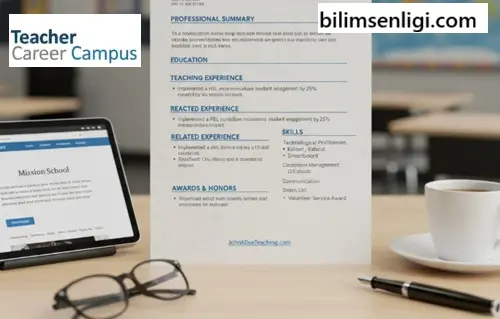Teaching is not just a profession; it is a passion and a journey of continuous learning. The privilege of inspiring future generations and leaving a lasting mark on their lives makes this profession unique. However, as you embark on this journey or seek to advance your career, you must never overlook the critical importance of gaining work experience.
So, why is teaching experience so vital? And more importantly, how can we acquire this valuable experience?
Why Teaching Experience is of Vital Importance
Work experience in teaching is a catalyst that transforms theoretical knowledge into practical skills. It is the most fundamental way for you to develop yourself as an educator, build your unique teaching style, and gain self-confidence in the classroom.
Gaining experience is not merely about learning to manage a classroom; it also allows you to clarify your career path, explore different teaching environments, and, most crucially, build a strong, diverse, and appealing CV (resume).
The Priceless Advantages That Experience Offers You:
- Ability to Apply for Desired Positions: Experience is the key that opens the doors to your dream teaching roles.
- Comprehensive Understanding of the Profession: You learn through experience that teaching involves more than just delivering lessons; it encompasses parent communication, curriculum development, and administrative processes.
- Skill Development and Expansion: You practice and enhance your fundamental teaching skills, such as classroom management, differentiation, student motivation, and assessment.
- Career Development and Exploring Options: Experience shows you which age group, subject, and environment you prefer to work in, helping you chart the right course for your career.
- Strengthening Your CV: Relevant experience makes you stand out to employers, giving you an edge over other candidates.
- Learning from Other Teachers: Experience provides opportunities to collaborate with colleagues, observe their methods, and receive mentorship.
- Boosting Self-Confidence: Every successful lesson and every challenging situation you navigate builds your confidence in the classroom.
11 Effective Ways to Gain Work Experience in Teaching
Whether you are a newcomer to the profession or looking to add something new to your resume, gaining teaching experience begins with exploring the opportunities around you. Here are concrete steps to increase your career prospects:
- Contact Local Schools Directly
Reaching out directly to public and private schools is one of the most fundamental ways to gain experience. Ask about opportunities for observing (shadowing) teachers in action or on-the-job assignments.
Tip: Check the school’s website to find out who you should contact (principal, assistant principal, relevant department head) and their preferred method of communication (email, phone). If possible, consider shadowing or observing in different grade levels to gain a broader perspective on teaching methods and approaches.
- Reach Out to Nurseries, Kindergartens, and Community Colleges
Nurseries, kindergartens, or community colleges may offer teaching assistant or helper positions. Even if they are not currently hiring, don’t hesitate to ask about volunteering opportunities. For instance, inquire if you can assist in a lab, on field trips, or with grading exam papers. This is an excellent way to gain experience, particularly in early childhood or adult education.
- Tap Into Your Family and Friends Network
Reach out to the people in your circle. A relative might be a teacher, or a friend might know an administrator at an educational institution. Use your network and let everyone know you are job hunting. They can help you not only with job leads but also with updating your CV and refining your cover letters.
- Consult with Your Alma Mater
Whether it’s your high school or university, your former school may have opportunities for you to gain teaching experience. Consider seeking guidance and advice from your former teachers or counselors. They might be aware of paid or volunteer positions that have not yet been publicly announced. If you are still a student, ask your advisor about internships or work experience modules within your coursework.
- Consider Tutoring
Tutoring is a great way to enter a classroom-like setting where you work with students to improve their grades or deepen their understanding of a subject. University career services, student unions, or clubs may be the right places to contact to find students who need tutoring. Tutoring not only boosts your credibility but also allows you to meet other teachers and educators who become part of your network.
- Utilize a Placement Agency
Recruitment or placement agencies can help you find paid work and guide you through the hiring process. Discuss teaching assistant positions or related teaching opportunities with temp agencies. In some areas, placement agencies provide substitute teachers; ask if the agency can place you in a substitute role.
- Become a Teaching Assistant or Substitute
Assisting teaching (as a teaching assistant) allows you to gain experience while helping you earn recognition as a teacher. Apply to local universities for volunteering opportunities. Substitute teaching exposes you to different classes and age groups, providing comprehensive teaching experience. School boards or districts may advertise substitute teacher positions directly or work through a placement agency.
- Look at Charitable Organizations and NGOs
You might find opportunities at charitable organizations or NGOs like the YMCA, which may offer after-school services or programs where you can tutor or assist. You can gain experience by mentoring students, coaching a sports team, or participating in summer camp programs. Keep in mind that these positions often run on a volunteer basis, but they are incredibly valuable for your CV.
Other Potential Opportunities:
- Coaching a team sport
- Assisting with scouting organizations
- Summer camp counseling
- Become a STEM Ambassador (Science, Technology, Engineering, Mathematics)
If you are strong in science, technology, engineering, or mathematics, becoming a STEM ambassador is a fantastic path. This role aims to inspire and encourage students in these subjects. You share your passion and encourage younger students to consider a career option in one of these fields. Contact local schools to find out how you can assist with a STEM project.
- Consider Non-Traditional Roles
Teaching experience does not always have to be within four walls. Share what you know or teach a hobby.
- Offer to create a course or workshop and present it to your local community center or education center.
- Develop an online course or webinar and market it on your social media networks or teacher message boards.
- Participate in online tutoring platforms.
These types of roles enable you to gain valuable skills in curriculum development, presentation skills, and student engagement.
- (Bonus) Research “Teach for America” Style Programs
If there are programs similar to Teach for America in your country or abroad (initiatives that offer two years of teaching in underserved areas, for example), research them. These programs often provide intensive training and place you in the field, allowing you to gain comprehensive teaching experience even with little prior background.
Conclusion: Gaining Experience is a Marathon, Not a Sprint
Gaining work experience in teaching requires being proactive, networking, and thinking creatively. Every experience, whether paid or voluntary, makes you a more competent, confident, and well-equipped educator.
Remember: Every line you add to your CV is not just a job description; it is an investment you make in providing a better future for your students. Start exploring opportunities right now!
What do you think is the most valuable experience a teacher can gain in their early career years?






